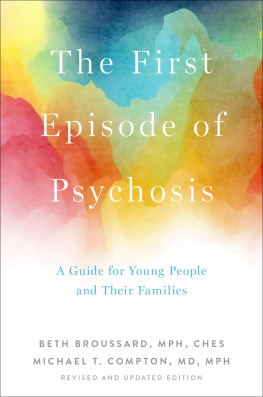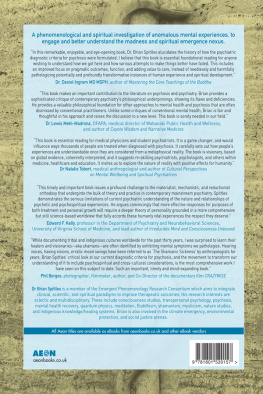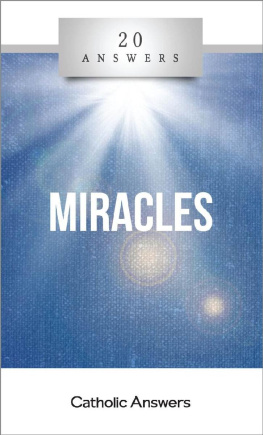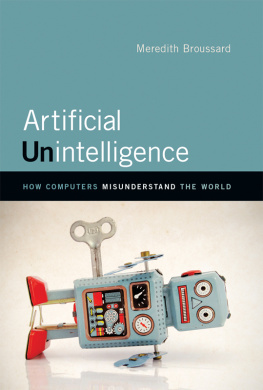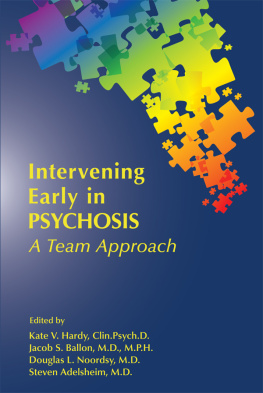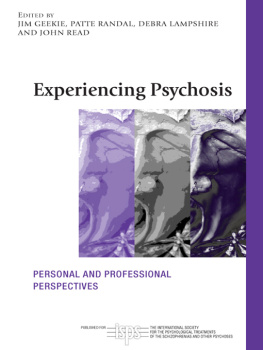Beth Broussard - The First Episode of Psychosis
Here you can read online Beth Broussard - The First Episode of Psychosis full text of the book (entire story) in english for free. Download pdf and epub, get meaning, cover and reviews about this ebook. year: 2021, publisher: Oxford University Press, genre: Home and family. Description of the work, (preface) as well as reviews are available. Best literature library LitArk.com created for fans of good reading and offers a wide selection of genres:
Romance novel
Science fiction
Adventure
Detective
Science
History
Home and family
Prose
Art
Politics
Computer
Non-fiction
Religion
Business
Children
Humor
Choose a favorite category and find really read worthwhile books. Enjoy immersion in the world of imagination, feel the emotions of the characters or learn something new for yourself, make an fascinating discovery.
- Book:The First Episode of Psychosis
- Author:
- Publisher:Oxford University Press
- Genre:
- Year:2021
- Rating:3 / 5
- Favourites:Add to favourites
- Your mark:
- 60
- 1
- 2
- 3
- 4
- 5
The First Episode of Psychosis: summary, description and annotation
We offer to read an annotation, description, summary or preface (depends on what the author of the book "The First Episode of Psychosis" wrote himself). If you haven't found the necessary information about the book — write in the comments, we will try to find it.
The First Episode of Psychosis — read online for free the complete book (whole text) full work
Below is the text of the book, divided by pages. System saving the place of the last page read, allows you to conveniently read the book "The First Episode of Psychosis" online for free, without having to search again every time where you left off. Put a bookmark, and you can go to the page where you finished reading at any time.
Font size:
Interval:
Bookmark:


Oxford University Press is a department of the University of Oxford. It furthers the Universitys objective of excellence in research, scholarship, and education by publishing worldwide. Oxford is a registered trade mark of Oxford University Press in the UK and certain other countries.
Published in the United States of America by Oxford University Press
198 Madison Avenue, New York, NY 10016, United States of America.
Oxford University Press 2021
All rights reserved. No part of this publication may be reproduced, stored in a retrieval system, or transmitted, in any form or by any means, without the prior permission in writing of Oxford University Press, or as expressly permitted by law, by license, or under terms agreed with the appropriate reproduction rights organization. Inquiries concerning reproduction outside the scope of the above should be sent to the Rights Department, Oxford University Press, at the address above.
You must not circulate this work in any other form and you must impose this same condition on any acquirer.
Library of Congress Cataloging-in-Publication Data
Names: Broussard, Beth, author. | Compton, Michael T., author.
Title: The first episode of psychosis : a guide for young people and their
families / Beth Broussard., Michael T. Compton
Description: Revised and Updated edition. | New York, NY : Oxford University Press,
[2021] | Includes bibliographical references and index.
Identifiers: LCCN 2020026338 (print) | LCCN 2020026339 (ebook) |
ISBN 9780190920685 (paperback) | ISBN 9780190920708 (epub) |
ISBN 9780197542514
Subjects: LCSH: PsychosesPopular works.
Classification: LCC RC512 .C58 2021 (print) | LCC RC512 (ebook) |
DDC 616.89dc23
LC record available at https://lccn.loc.gov/2020026338
LC ebook record available at https://lccn.loc.gov/2020026339
10.1093/med/9780190920685.001.0001
The weeks and months during and following an initial episode of psychosis can be incredibly challenging, and also frightening, for young people, their families, and their broader social networks. During this period, access to reliable, up-to-date information is critical. This is exactly what this book provides: accurate and helpful information, resources, and support. The book educates readers about the symptoms of psychosis and how they are defined, the meaning of different diagnoses, and what the latest science tells us about underlying causes and effective treatments. Material covered includes the initial evaluation of psychosis, advances in the area of early intervention services, and information on evidence-based medications and psychosocial treatments. Importantly, chapters also provide practical advice on treatment engagement, relapse prevention, physical health and well-being, returning to school or work, and effective communication.
Since the first edition, much has changed in the treatment of first-episode psychosis. Specialized early intervention programs are now available in virtually every U.S. state, and in many parts of the world. These programs are team-based, recovery-focused, infused with shared decision-making, and centered around the young persons and familys own goals. The worksheets in this bookand the entire book itselfare designed to increase young peoples and family members knowledge and confidence, in turn strengthening communication with mental health professionals.
A fundamental message of this book is that treatment is effective and recovery is possible. I say that with confidence in part because I have been there: experiencing early psychosis, benefiting from specialized early intervention services, and now living a rich, and in many ways very normal, life. Early in the course of psychosis it is of course easy to feel overwhelmed and hopeless; I encourage readers to always remain hopeful. While the challenges are real, thousands of young people in recovery, pursuing their goals, attest to the fact that challenges can be overcome. What can easily seem like a dead end in hindsight turns out to have been just a bend in the road. On that road, this book and the recovery-oriented supports it describes are a powerful resource on the journey to recovery.
Internationally, thousands of studies on psychosis are published every year. In this book, Beth Broussard and Michael Compton have distilled this science to what young people and families most need to know. Of course, mental health professionals will also share information tailored to individual situations, but the information contained in this book provides a comprehensive foundation regarding what we know about the causes, diagnosis, prognosis, and treatment of psychosis, and guidance on getting back on track. There are certainly still many things we dont fully understand about psychosis, but the field has made many important advances in the past decade and continues to move forward. This updated second edition reflects what we know and helps support the recovery process.
Nev Jones, PhD,
Assistant Professor, Morsani College of Medicine,
Department of Psychiatry and Behavioral Neurosciences,
University of South Florida,
Tampa, FL, USA
While the questions that open Chapter 1often asked by young people experiencing psychosis and their familiesmight be the same as those from more than a decade ago when the first edition of this book was published, the answers have evolved. Treatment is getting better. Hope is more pertinent than ever before. Recovery and a full life are now achieved by many more people facing a first episode of psychosis. In this second edition, we share the latest information that we think will help you most effectively deal with this difficult situation. We have again aimed to provide readers with a complete guide explaining everything you need to know during this critical time of initial evaluation and treatment.
We often use the terms first episode of psychosis, first-episode psychosis, and early psychosis. They refer to the initial period of experiencing symptoms and the mental health evaluation and treatment for this episode of psychosis. Some individuals will go on to experience further episodes of psychosis, in which case the use of the term first episode is truly warranted. However, we do not mean to suggest that everyone who has a first episode of psychosis will necessarily go on to have future episodes. For some people, the symptoms clear up with treatment and they achieve long-term remission and recovery without later episodes.
We want to provide you with the information that you need to begin a path toward recovery or to go about helping your loved one embrace recovery. We invite you to read this book and gather from it whatever information is helpful to you. The book is divided into three parts, each one building on the next as you learn more about the first episode of psychosis. Important terms are shown in bold and definitions for each of these words are included in the glossary at the end of the book. We also invite you to visit a straightforward companion website for additional resources, including printable versions of the worksheets found in the book. Visit: www.oup.com/firstepisodepsychosis.
Hope and optimism for recovery are warranted, especially given the growing availability of specialty care. However, our optimism is balanced by a deep recognition of how serious the first episode of psychosis is. We strongly encourage young people and families to seek evaluation and treatment as soon as possible; to work together with experienced, specialized mental health professionals; and to stick with treatment. Through collaboration with experts in the treatment of psychosis, young people with psychosis and their families have the best chance to move beyond psychosis and toward recovery.
Font size:
Interval:
Bookmark:
Similar books «The First Episode of Psychosis»
Look at similar books to The First Episode of Psychosis. We have selected literature similar in name and meaning in the hope of providing readers with more options to find new, interesting, not yet read works.
Discussion, reviews of the book The First Episode of Psychosis and just readers' own opinions. Leave your comments, write what you think about the work, its meaning or the main characters. Specify what exactly you liked and what you didn't like, and why you think so.

